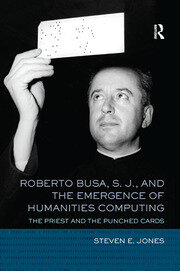Steven E. Jones, Roberto Busa, S. J., and the Emergence of Humanities Computing: The Priest and the Punched Cards, Routledge, London – New York 2016, 196 PP., ISBN: 9781315643618
Main Article Content
Abstract
Review of:
Steven E. Jones, Roberto Busa, S. J., and the Emergence of Humanities Computing: The Priest and the Punched Cards, Routledge, London – New York 2016, 196 PP., ISBN: 9781315643618.
Downloads
Article Details
Proposed Policy for Journals that Offer Open Access
Authors who publish with this journal agree to the following terms:
- Since issue IV and for the future issues, it is the policy of the publisher that authors retain copyright and grant the journal right of first publication with the work simultaneously licensed under a Creative Commons Attribution License that allows others to share the work with an acknowledgement of the work's authorship and initial publication in this journal.
- Authors are able to enter into separate, additional contractual arrangements for the non-exclusive distribution of the journal's published version of the work (e.g., post it to an institutional repository or publish it in a book), with an acknowledgement of its initial publication in this journal.
- Authors are permitted and encouraged to post their work online (e.g., in institutional repositories or on their website) prior to and during the submission process, as it can lead to productive exchanges, as well as earlier and greater citation of published work (See The Effect of Open Access).
References
https://2022.computational-humanities-research.org/
https://belter.hypotheses.org/64
https://www.corpusthomisticum.org/it/index.age;jsessionid=948AD0B0FAC46BEF8A6F87E3E08BEF5D
https://demo.hedgedoc.org/s/rJ_YoK_cH
https://discourse.computational-humanities-research.org/
https://www.ibm.com/ibm/history/ibm100/us/en/icons/preservation/
https://priestandpunchedcards.tumblr.com/
https://tedunderwood.com/2019/07/15/do-humanists-need-bert/
Busa, Roberto, « Announcements: Complete Index Verborum of Works of St. Thomas », Speculum, 25/3 (1950), p. 424–426.
— Sancti Thomae Aquinatis Hymnorum Ritualium Varia Specimina Concordantiarum. A First Example of Word Index Automatically Compiled and Printed by IBM Punched Card Machines, Fratelli Bocca, Milano 1951 (Archivum Philosophicum Aloisianum. A cura della Facoltà di Filosofia dell’Istituto Aloisianum S.J. Serie II, n. 7).
— « L’analisi linguistica nell’evoluzione mondiale dei mezzi d’informazione », in Sergio Morando (ed.), Almanacco Letterario Bompiani, Bompiani, Milano 1962, p. 103–107.
— « The Annals of Humanities Computing: The Index Thomisticus », Computers and the Humanities, 14/2 (1980), p. 83–90.
Da, Nan Z., « The Computational Case against Computational Literary Studies», Critical Inquiry, 45/3 (2019), p. 601–639.
Emerson, Lori, Reading Writing Interfaces: From the Digital to the Bookbound, University of Minnesota Press, Minneapolis 2014 (Electronic Mediations).
Hengchen, Simon, Nina Tahmasebi, Dominik Schlechtweg, Haim Dubossarsky, « Challenges for Computational Lexical Semantic Change », in Nina Tahmasebi, Lars Borin, Adam Jatowt, Yang Xu, Simon Hengchen (eds.), Computational Approaches to Semantic Change, Language Science Press, Berlin 2021 (Language Variation 6), p. 341–372.
Jones, Steven E., The Emergence of the Digital Humanities, Routledge, New York 2013, https://doi.org/10.4324/9780203093085.
— How We Got To Now: Six Innovations That Made the Modern World, Riverhead Books, New York 2014.
Mcgillivray, Barbara, Thierry Poibeau, Pablo Ruiz Fabo, « Digital Humanities and Natural Language Processing: Je t’aime... Moi Non Plus », Digital Humanities Quarterly 14/2 (2020), http://www.digitalhumanities.org/dhq/vol/14/2/000454/000454.html.
Nyhan, Julianne, Marco Passarotti (eds.), One Origin of Digital Humanities: Fr Roberto Busa in His Own Words, Springer International Publishing, Cham 2019, https://doi.org/10.1007/978-3-030-18313-4.
Ramsay, Stephen, Reading Machines: Toward an Algorithmic Criticism, University of Illinois Press, Urbana 2011 (Topics in the Digital Humanities).
Terras, Melissa, Julianne Nyhan, « Chapter 6. Father Busa’s Female Punch Card Operatives », in Matthew K. Gold, Lauren F. Klein (eds.), Debates in the Digital Humanities, University of Minnesota Press, Minneapolis – London 2016, p. 60–65.
Zielinski, Siegfried, Deep Time of the Media: Toward an Archaeology of Hearing and Seeing by Technical Means, MIT Press, Cambridge, MA 2008 (Electronic Culture: History, Theory, and Practice).
